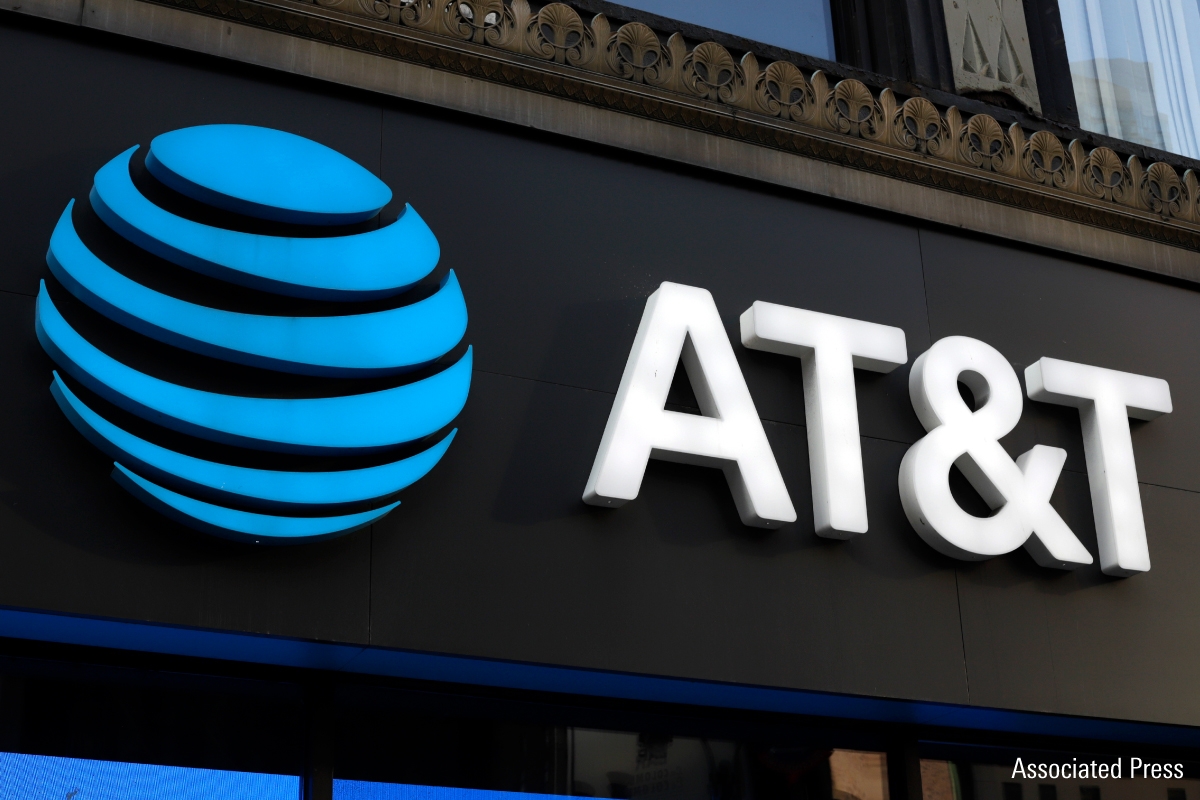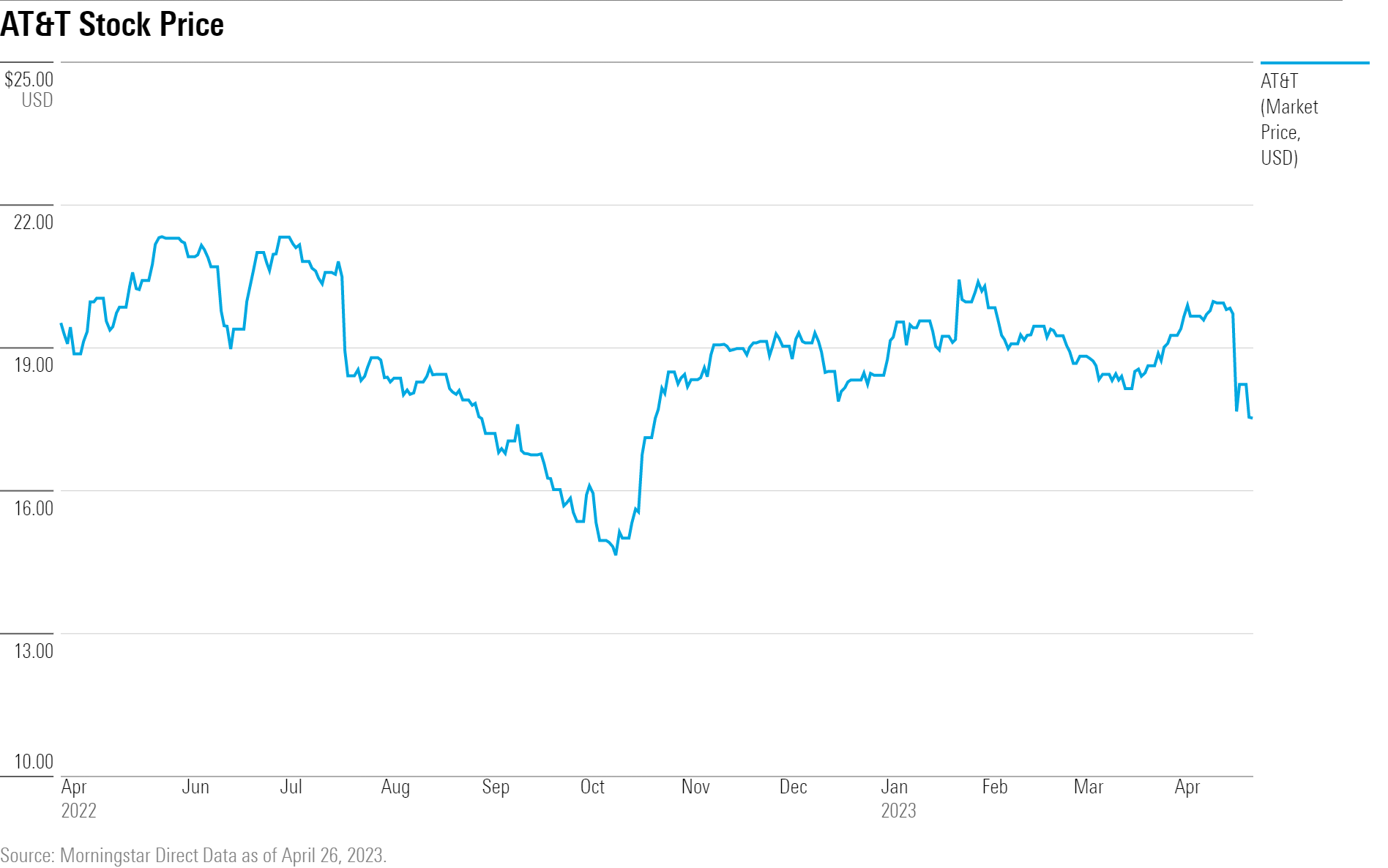Is AT&T Stock a Buy After Earnings?
AT&T’s 5G investing has us optimistic for the long-term growth of the company.

AT&T T released its first-quarter earnings report on April 20. Here’s Morningstar’s take on how investors should view AT&T’s earnings, the company’s long-term outlook, and the stock.
Key Morningstar Metrics for AT&T
- Fair Value Estimate: $25
- Morningstar Rating: 4 stars
- Morningstar Uncertainty Rating: Medium
- Morningstar Economic Moat Rating: Narrow
What We Thought of AT&T’s Q1 Earnings
We think AT&T’s first quarter was broadly in line with expectations, with two major areas causing debate among investors:
- Free cash flow: AT&T has struggled to hit its free cash flow targets in recent years—just last year it was forced to cut 2022 expectations in July. The firm expects to generate $16 billion in 2023, up from $14 billion in 2022, and it told investors to expect that the bulk of that amount would hit during the second half of the year, which is normal given the seasonality of vendor payments for phones and bonus payouts. But free cash flow was only $1 billion in the quarter, down from $2.8 billion the year before. Management was adamant that it will hit the $16 billion target this year nonetheless, as working capital needs even out. It seems investors are split between those who think AT&T management is simply not credible and those who believe it was so badly burned a year ago that it won’t repeat the same mistake. From our perspective, we think the firm would be better off not giving a free cash flow forecast because cash flow is subject to the vagaries of things like vendor payments and because trying to hit a target creates poor incentives. If the firm does fall short of its forecast, we suspect it will be due to factors that aren’t that meaningful for long-term success.
- Postpaid wireless phone customer net additions: The firm added 424,000 net postpaid phone customers during the quarter, down 39% from 691,000 a year ago and the slowest pace in nearly three years. The postpaid wireless market has been growing at a torrid pace over the past two years. We don’t think anyone is quite sure what has been driving that growth, but AT&T and others have been calling for normalization in 2023. We won’t know until other firms have reported how AT&T fared versus rivals, but we think the firm is doing fine in terms of customer growth. The pace of customer defections (churn) remains very low, and we suspect the firm simply isn’t chasing uneconomical growth the way some other are, especially the cable companies.
Overall, a single quarter doesn’t usually provide a ton of insight into the long-term prospects for telecom or cable firms. We think AT&T continues to say the right things. It is investing aggressively in 5G wireless network capacity and expansion of its fiber network. About 55% of the firm’s residential broadband customer base is on its fiber network, up from 45% a year ago. Wireless churn metrics indicate customers are generally happy with the quality of its wireless network. We think both network initiatives provide support for long-term customer relationships that will drive steady, albeit modest, revenue growth over the long term. As network projects wrap up, cash flow should increase as well.
Is AT&T Stock a Buy, a Sell, or Fairly Valued?
At a 4-star rating, we believe AT&T stock is undervalued when compared with our fair value estimate.
Our $25 fair value estimate assumes that AT&T will deliver modest revenue growth and gradually expanding margins over the next several years as its wireless and fiber network investments pay off. Our fair value estimate implies an enterprise value of 8.0 times our 2023 EBITDA estimate and a 7% free cash flow yield. In wireless, we expect AT&T will slowly gain market share over the next few years, though the near term could prove bumpy as the cable companies continue working to establish their wireless businesses. We expect the consumer broadband business will deliver steadily improving growth as the fiber network buildout matures. We expect the enterprise services business will gradually return to growth in the coming years with profitability holding steady as cost-cutting balances the loss of higher-margin legacy services. AT&T hasn’t provided much detail surrounding the enterprise business, making it more difficult to forecast future results. In total, we believe consolidated revenue can grow 2%-3% annually over the next five years.
Read more about AT&T’s fair value estimate.

Morningstar Economic Moat Rating
Wireless is AT&T’s most important business. Returns on capital in wireless have eroded somewhat in recent years as the firm has spent heavily on wireless spectrum and invested to put that spectrum to use. We expect that wireless returns will remain ahead of AT&T’s cost of capital. Verizon, AT&T, and T-Mobile dominate the U.S. wireless market, collectively claiming nearly 90% of retail postpaid and prepaid phone customers between them and supplying the network capacity to support most other players. Each of the three major carriers has pledged substantial capital returns to shareholders: AT&T’s new dividend totals $8 billion annually and Verizon’s nearly $11 billion, while T-Mobile has said it can repurchase up to $60 billion of its shares through 2025. AT&T is one of only a handful of companies capable of providing complex communications services to business customers with geographically diverse needs. AT&T’s last significant business, consumer fixed-line services, doesn’t possess a moat, in our view. We estimate AT&T’s consumer fixed-line networks reach around 55 million homes, or a bit less than half of the U.S. population.
Read more about AT&T’s moat rating.
Risk and Uncertainty
We have changed our Morningstar Uncertainty Rating to Medium from High to better reflect the volatility we expect AT&T investors will face relative to our global coverage. Regulation and technological change are the primary uncertainties facing AT&T. Regulators also control the flow of wireless spectrum into the industry, which has created scarcity in the past, pushing carriers to pay high prices for licenses. On the technology front, wireless standards continue to evolve, putting more spectrum to use more efficiently. While unlikely, in our view, wireless technology could also remove the need for AT&T’s fixed-line networks, killing returns on its fiber investments.
Read more about AT&T’s risk and uncertainty.
AT&T Bulls Say
- Following a period of investment, AT&T will hold a nationwide 5G wireless network with deep spectrum behind it and a fiber network capable of reaching nearly one fourth of the United States.
- AT&T has the scale to remain a strong wireless competitor over the long term. With three dominant carriers, industry pricing should be more rational going forward.
- Combining wireless and fixed-line networks with new technologies and deep expertise makes AT&T a force in enterprise services.
AT&T Bears Say
- The cost of maintaining dominance in the wireless industry by controlling spectrum has been exceptionally high over the years. AT&T has spent $40 billion over the past three years for licenses with few prospects for incremental revenue.
- Advancing technology will eventually swamp AT&T’s wireless business, enabling a host of firms to enter the market, further commoditizing this service.
- AT&T’s massive debt load will catch up with it. Even after spinning off Warner with a huge amount of debt, AT&T carries far higher leverage than it has historically and its dividend payout remains high.
Get access to full Morningstar stock analyst reports, along with data and tools to manage your portfolio through Morningstar Investor. Learn more and start a seven-day free trial today.
The author or authors do not own shares in any securities mentioned in this article. Find out about Morningstar’s editorial policies.

/s3.amazonaws.com/arc-authors/morningstar/12c6871b-2322-44d8-bd98-0437fa1a0a07.jpg)
/cloudfront-us-east-1.images.arcpublishing.com/morningstar/ECVXZPYGAJEWHOXQMUK6RKDJOM.jpg)
/cloudfront-us-east-1.images.arcpublishing.com/morningstar/KOTZFI3SBBGOVJJVPI7NWAPW4E.jpg)
/cloudfront-us-east-1.images.arcpublishing.com/morningstar/V33GR4AWKNF5XACS3HZ356QWCM.jpg)
:quality(80)/s3.amazonaws.com/arc-authors/morningstar/12c6871b-2322-44d8-bd98-0437fa1a0a07.jpg)